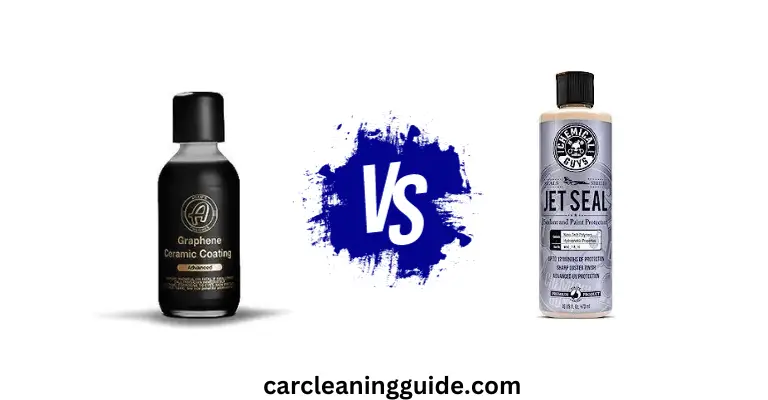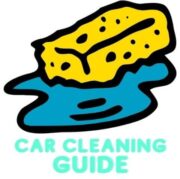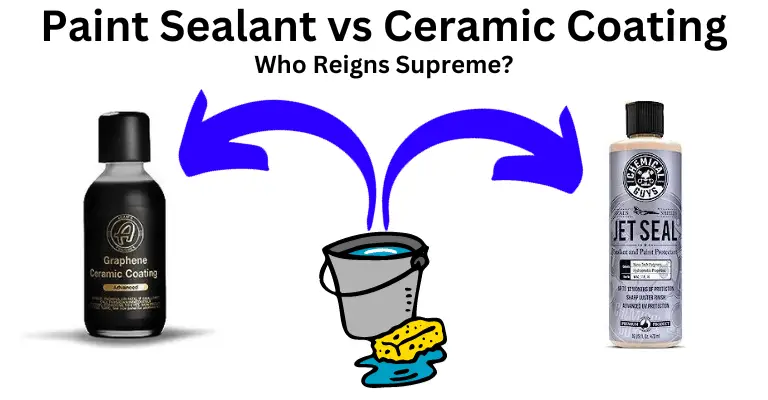- How to Clean Car Carpets Quick and Easy - July 10, 2024
- Can You Touch Up Clear Coat? Yes and No (Here’s Why) - November 25, 2023
- How To Wax A Car By Hand: A Comprehensive Guide - November 14, 2023
Last Updated on November 9, 2023 by Chase Manhattan
In the world of automotive detailing, few debates are as heated as the one between paint sealants and ceramic coatings.
Both promise to shield your vehicle’s paint from the harsh realities of the road, but which one truly delivers? Is it the tried-and-true paint sealant with its rich history and evolution, or the newer, shinier ceramic coating that’s taken the automotive world by storm?
If you’ve ever found yourself scratching your head at the detailing aisle or listening intently to a car enthusiast passionately defend their choice, you’re not alone. Dive into this comprehensive guide where we’ll unravel the mysteries, compare the two, and help you make an informed decision for your prized possession.
What We'll Discuss: - Evolution of Paint Sealant Technology - Differences and Similarities between Paint Sealants and Ceramic Coatings - Detailed Breakdown of Features and Benefits - Factors Influencing the Choice between Paint Sealants and Ceramic Coatings - Pros and Cons of Each Option - Personalized Recommendations based on Needs and Circumstances - Expert Verdict on the Ongoing Debate
Quick Navigation
Brief Overview Of Paint Sealant Technology Progression
Paint sealants have come a long way since their inception. Initially, they were primarily wax-based products that provided a temporary shine and protection against minor contaminants. Over the years, advancements in polymer technology have led to the development of synthetic sealants that offer longer-lasting protection and enhanced durability. These modern sealants bond chemically with the paint surface, providing a barrier against UV rays, acid rain, and other environmental contaminants.
So, Are Paint Sealants and Ceramic Coatings The Same Thing or Different?
At a glance, paint sealants and ceramic coatings might seem similar, but they serve different purposes and have distinct compositions. While both provide protection to the car’s paint, their longevity, application process, level of protection, and sometimes intended use may vary.
Paint Sealant vs Ceramic Coating: A Full Breakdown

| Feature | Paint Sealant | Ceramic Coating |
|---|---|---|
| Longevity | 6-12 months | 2-5 years |
| Application | Easier, DIY-friendly | Professional application recommended |
| Protection Level | Moderate | High |
| Cost | Lower | Higher |
| Maintenance | Regular reapplication needed | Minimal maintenance required |
Intended Use of Paint Sealant
Paint sealants are designed for those who seek a cost-effective solution to protect their car’s paint from contaminants and UV rays. They are perfect for daily drivers and those who don’t want to invest heavily in paint protection but still want a decent level of protection.
Pros
- Affordable
- Easy to apply
- Provides decent protection
Cons
- Shorter lifespan
- Requires regular reapplication
- Not as durable as ceramic coatings
Intended Applications for Ceramic Coating
Ceramic coatings are for car enthusiasts and owners who want the best protection for their vehicle. It’s ideal for luxury cars, classic cars, or any vehicle where long-term paint protection is a priority.
Pros
- Long-lasting protection
- Resistant to chemical contaminants
- Enhances paint’s depth and gloss
Cons
- Expensive
- Requires professional application
- Longer curing time
Which Would I Recommend? It Depends
The decision between paint sealants and ceramic coatings isn’t black and white. Several factors come into play when determining which is the best fit for your vehicle:
Related: How Many Layers of Ceramic Coating Is Best for Longevity?
- Needs:
- Protection Level:
- If you’re looking for basic protection against contaminants and UV rays, a paint sealant might suffice. However, if you’re seeking a robust shield against harsher elements, chemical contaminants, and want something that enhances the paint’s depth and gloss, ceramic coatings are the way to go.
- Longevity:
- How often are you willing to reapply the product? Paint sealants require more frequent applications, while ceramic coatings can last for years.
- Protection Level:
- Budget:
- Paint sealants are generally more affordable, both in terms of the product’s cost and the application (especially if you’re going the DIY route). Ceramic coatings, on the other hand, are an investment. Not only is the product itself pricier, but professional application can also add to the cost.
- Vehicle Use:
- Frequency of Use:
- If your car is a daily driver, exposed to various elements regularly, a ceramic coating might offer the protection it needs. On the other hand, if you have a secondary car that isn’t used as frequently, a paint sealant might be sufficient.
- Environmental Exposure:
- Cars parked in covered areas or garages might not require the heavy-duty protection of a ceramic coating. However, vehicles exposed to harsh sunlight, coastal conditions, or frequent rain might benefit more from a ceramic coating.
- Purpose of the Vehicle:
- For luxury or classic cars, where maintaining the vehicle’s appearance is paramount, ceramic coatings are often the preferred choice. For everyday vehicles, where function might outweigh aesthetics, paint sealants could be more appropriate.
- Frequency of Use:
Where Do Paint Sealants Shine?
Paint sealants are excellent for those on a budget or for cars that aren’t exposed to harsh conditions regularly. They’re also great for those who enjoy the process of regularly detailing their cars.
When Is A Ceramic Coating Best?
If you’re looking for the ultimate protection, and you’re willing to invest in your vehicle’s appearance and protection, a ceramic coating is the way to go. It’s especially beneficial for cars in rough conditions, harsh climates or those exposed to contaminants frequently.
Verdict: Is One Better? Yes and No (My Opinion)
When it comes to paint protection, there isn’t a one-size-fits-all answer. Both paint sealants and ceramic coatings have their merits, and the “better” option often boils down to individual preferences and circumstances.

- Effectiveness:
- Ceramic coatings undoubtedly offer superior protection. Their chemical composition ensures a stronger bond with the car’s paint, offering a more durable shield against potential damage. This doesn’t mean paint sealants are ineffective; they simply operate on a different scale of protection.
- Aesthetic Appeal:
- Ceramic coatings often give the car a richer, deeper shine that many car enthusiasts crave. The gloss from a ceramic coating can make the paint look vibrant and new, while paint sealants offer a shine that, while still impressive, might not have the same depth.
- Maintenance and Upkeep:
- Paint sealants require more frequent reapplication, which can be seen as a drawback. However, this also allows for more regular interaction with your vehicle’s paint, which some car enthusiasts enjoy. Ceramic coatings, with their longer lifespan, require less frequent touch-ups, making them more set-it-and-forget-it.
- Cost Implications:
- While ceramic coatings come with a higher upfront cost, they might prove more economical in the long run due to their longevity. Paint sealants, while cheaper initially, might end up costing more over time due to the need for frequent reapplications.
Basically, neither product is universally “better.” It’s about aligning the product with your specific needs, preferences, and circumstances. Both offer valuable protection; it’s just a matter of determining which one aligns more closely with what you’re looking for.
If you’re looking for a second opinion, check out this video:
How To Choose Which One Is Right For You
Consider your budget, how long you plan to keep the car, the environmental conditions your car is exposed to, and how often you’re willing to reapply or maintain the product.
FAQs
Why might someone choose a paint sealant over a ceramic coating?
Paint sealants are more budget-friendly and are easier to apply, making them suitable for those who prefer a DIY approach or are not looking for long-term protection.
How often do I need to reapply a ceramic coating?
Typically, a high-quality ceramic coating can last between 2-5 years, depending on environmental conditions and maintenance. It doesn’t require frequent reapplication like paint sealants.
Can I apply a ceramic coating over a paint sealant?
It’s not recommended. For the ceramic coating to bond effectively with the paint, the surface needs to be free from any other products, including paint sealants.
Is the shine from a ceramic coating different from that of a paint sealant?
Yes, ceramic coatings often provide a deeper, more reflective shine due to their chemical composition and the way they bond with the paint.
Do these products protect against scratches?
While they provide a level of protection against minor scratches and contaminants, neither paint sealants nor ceramic coatings make the paint scratch-proof. Proper care and maintenance are still essential.
Wrapping Up
Navigating the intricate world of automotive detailing can often feel like a maze, especially when faced with choices like paint sealants and ceramic coatings. But as we’ve journeyed through this guide, a few key takeaways have emerged:
- Evolution Matters: Paint sealants have evolved significantly over the years, transitioning from basic wax-based solutions to advanced polymers. Their journey is a testament to the continuous innovation in the automotive world.
- Distinct Yet Similar: While paint sealants and ceramic coatings serve the overarching purpose of protecting your car’s paint, they differ in longevity, application, protection level, and cost. It’s essential to understand these nuances to make an informed choice.
- Tailored Choices: The best choice isn’t universal; it’s personal. Whether you prioritize budget, longevity, or the level of protection, there’s a solution tailored for you. It’s all about aligning the product with your specific needs and circumstances.
In the grand scheme of things, both paint sealants and ceramic coatings offer valuable protection for your vehicle. It’s not about choosing the “best” one but rather the “right” one for you. As you stand at the crossroads of decision-making, remember the insights from this guide, and choose confidently, knowing you’re making an informed decision for your vehicle’s longevity and shine.
Thanks for riding along with us on this journey! Whether you’re a seasoned car enthusiast or someone just starting in the world of automotive detailing, we hope this guide has shed some light on your path. Safe driving and happy detailing!

